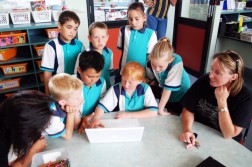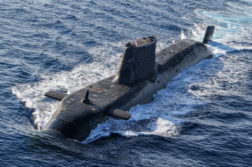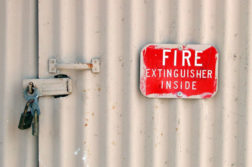What do I think about the Federal Government’s new national school curriculum? I’m glad you asked.
It is, of course, no small subject, particularly for those of us whom the gods have mocked with the interminable blessing of children. We are talking here of the very future of our children, our most precious non-uranium resource. Given that, according to the ABS, by 2060 over 80 per cent of Australia’s population will be old-age pensioners, it is fairly important that today’s children be taught to read and write so that they may get ludicrously high-paying jobs driving trucks on mining sites in order to support our massive wrinkly populace.
Yes, there is the possibility that by that time our economy will be driven by Indian 7-Eleven clerks and door-to-door Foxtel salesmen, but there is also the possibility that by that time we will have stabbed them all, so we should probably have a back-up plan and "education" is it.
So, the national curriculum. It’s a big reform, and it’s an important step towards lifting our educational standards, so it’s important we identify exactly what is wrong with it and discredit it completely before it does irreparable damage. So, let’s look at the thousands of problems with the plan.
Firstly, let me say: Christopher Pyne is right, and not just about how to be a snappy dresser. The new curriculum does emphasise the black armband view of history to the detriment of other, less funereal views.
I’m not suggesting we should replace the "black armband" view ("Isn’t it awful the way we murdered all the Aborigines") with the "white blindfold" view ("Aborigines quite like being murdered"). I just think we should try for a more nuanced view. A purple cravat view, perhaps, or a crimson bandana view. I think it’s important that whatever strip of fabric our history curriculum is based on, it’s a subtle and sophisticated one.
But really, there’s much too much emphasis on Aboriginal history anyway. When I was at school, Aboriginal history just touched on the important stuff: Bennelong and witchetty grubs, and then we moved on to bigger issues, like Malcolm Fraser’s underpants. Of course, today, Aboriginal history is different because there’s also Cathy Freeman but there’s still no reason to dwell on it. Aboriginal history is, like, two days, tops. There aren’t even very many of them around any more. I’ve never even met one. Well, I met a guy once who might have been one. Or he might have been Sri Lankan. I don’t know, it was a bit awkward, I didn’t stay long. Point is, if I ever do meet an Aborigine, it’s not going to help the evening go with a zing if I’m all burdened with guilt about how my great-great-grandfather used to steal his great-great-grandfather’s children and beat them to death every few days. It would kill the mood. It’d be like, "thanks a lot, Julia Gillard, for making my social life so inescapably awkward."
And how ludicrous is it that the curriculum doesn’t mention the Magna Carta? How exactly do we build the citizens of tomorrow without a thorough grounding in that? I’ll tell you: We don’t. When I was a lad, we had a compulsory one-hour Magna Carta Appreciation session every morning and it taught us respect which is exactly what the children of today need — and while we’re on the subject, why does the new curriculum have 8000 mentions of Eddie Mabo and no mentions at all of regular caning?
I mean, the curriculum does have its good points. For instance, it promises a return to the Three "R"s — or as people who have actually learned them know them, the One "R" And Also A "W" and an "A". This "back to basics" approach is refreshing, inasmuch as recent surveys indicate that the average Australian child cannot add numbers of more than one digit and identifies "books" as a food group.
But still, these positives cannot wallpaper over the cracks in this national curriculum — cracks of poorly thought out policy and ignorance that, if not quickly mended with the spack filler of commonsense and consultation, will quickly widen until the load-bearing wall of literacy and numeracy crumbles, bringing the whole house of childhood development crashing down about our ears, filling our nostrils with the plaster of delinquency and our lungs with the asbestos of limited career choices, until eventually we are forced out, homeless, to live on the streets of inadequate pension funds and die of the mesothelioma of stagnated scientific and creative industries. And the tragedy is that this is exactly the kind of metaphor our kids won’t be able to construct, thanks to Julia "If I have to have this accent, nobody gets to learn to read" Gillard and her Socialist Paradise-fevered dreams.
So, with the threat of our babies’ destruction fresh in our minds, what would a really GOOD curriculum look like? Once again, thanks for asking, though you took your time. To all the government ministers who I know read this column religiously, the following advice comes at no charge:
Firstly, calculators will be distributed to all students at the age of five, in order to instil in them the very important principle that since the invention of the calculator, everyone who has done maths without one has been an idiot.
Secondly, science classes will be designed with "student engagement" in mind. This will mean all science courses will focus on topics which involve explosions, fire and the separation of small animals from their vital organs, placing far less emphasis on the disciplines which involve large books and building miniature solar systems out of styrofoam.
Thirdly, all students will take monthly Apostrophe Tests, wherein they will be forced to correctly identify the problem with phrases such as "Your joking!" and "DVD’s and CD’s, half price!" Failure to pass these tests will be punishable by dentistry. As an adjunct to this, teachers will be permitted to punch anybody who uses the word "laxadaisical" in the face.
Fourthly, history will revolve around three themes: Gruesome Wars of Europe; Cowboys and Indians; and Torture Devices. Periods of history not featuring horrific deaths will be glossed over as having little to teach us. Australian politics will be excised from the history curriculum and taught as a unit of PE instead. As foreshadowed above, Aboriginal history will be taught as a special Christopher Pyne novelty handkerchief-making unit within home economics.
And lastly, with a view to building the industries and service economy of the future, home economics itself will take a central place in the curriculum, ensuring that when our children leave school to make their way in the world, they’re well-equipped to take up their positions behind the chip fryers and sewing machines that will be waiting with open arms for the brave new world they are destined to build.
Children — they can achieve great things, but unless we give them the right grounding and life skills, they won’t know how to deal with the realisation that they never will.
Donate To New Matilda
New Matilda is a small, independent media outlet. We survive through reader contributions, and never losing a lawsuit. If you got something from this article, giving something back helps us to continue speaking truth to power. Every little bit counts.



